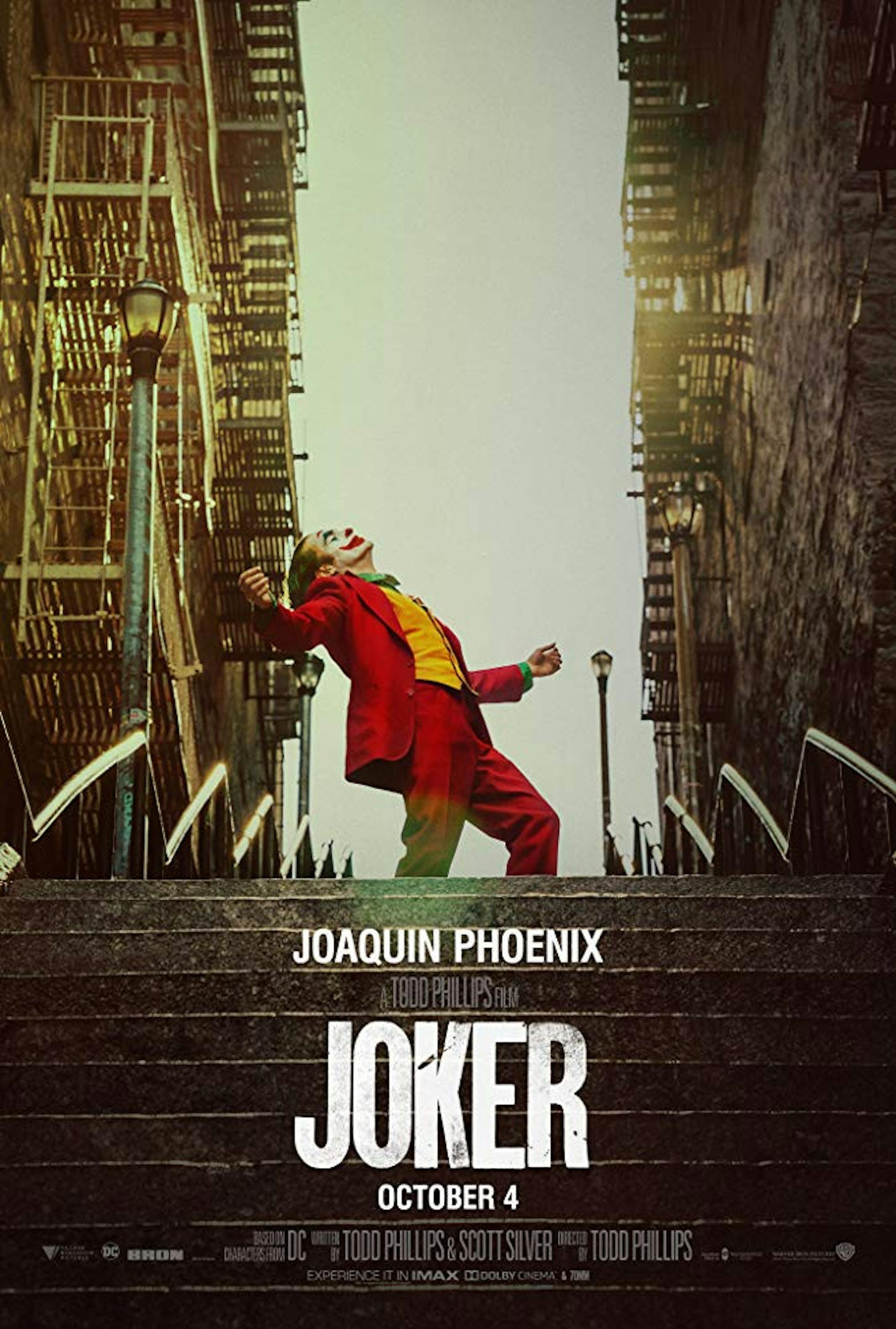Todd Phillips’ new film “Joker”(2019) is a dark, gritty and wholly unsettling reimagining of Batman’s most iconic villain. Through the lens of muted and grimy 1970s New York City-esque Gotham,“Joker” tells the story of main man Arthur Fleck’s maddened downward spiral to self-discovery.Fleck, played impeccably by Joaquin Phoenix, is an unfunny comic, a beaten-down clown, a loner, and a nervous and unsure weirdo. Like a colorful jack-in-the-box, Fleck, unassuming and overlooked, winds himself up until he reaches his loud bang of destructive self-realization.
“Joker” takes the larger-than-life comic book fixture and gives him a name and a history. It’s also a masterpiece of a character study. Phoenix is phenomenal as the titular Joker. While Phoenix nails this grounded yet unhinged insanity, it is the humanity of the character that makes him so creepy. Perhaps nothing exemplifies this point as well as Fleck’s laugh. The film’s version of the Joker laugh is gut-wrenchingly unnerving. Due to an (under-explained) neurological condition, Fleck is prone to fits of overwhelming, uncontrollable laughter. He flits between manic, choked cackles and a calm, blank disposition; the quick, whiplash-inducing transformations are bone-chilling. While past depictions show the Joker laughing in insanity, this version of the villain sees his insanity stem from his laughing tics. Fleck begins to embrace the uncontrollable, and his insanity finally consumes him when he welcomes the lawless and irrepressible laughter. Not only does Phoenix nail this laughter, he brings a beautifully haunting physicality to the screen. Whether Fleck is running full-bodied down a hallway or dancing in an abandoned gas station bathroom, his movements are lithe and measured. Phoenix’s movements are alluring, sublime and eerie. He is absolutely and completely transformed into Arthur Fleck.
The movie is devastatingly stunning. The set design is authentic and gritty. The cinematography creates a grainy, dimmed atmosphere that perfectly matches the character of the Joker. The costumes and makeup, too, lend a realistic air to the story. The reality of the story, the humanity that is shown in the city and the cinematic world, is beautifully done. The mundane realism of the setting gives the film legitimacy, and adds to the understated lunacy of the Joker. Additionally, the stark clown makeup is especially effective; it both adds to the absurdity of Fleck’s life at the beginning of the movie and magnifies the message that the clown and the Joker represent by the end of the movie, promoting both the pathetic dress-up clown and the sinister chaotic one.
The soundtrack and the score of “Joker” are perfect, too, effectively adding to the ambience of the setting and personifying the character’s story. The jaunty jazz music enhances the New York vibes, the clown-and-comedy-centric lyrics of the soundtrack underscore the film without being too on-the-nose, and the haunting cello-based score from composer Hildur Guðnadóttir adds to the exquisite unease of Arthur Fleck.
As a character study, “Joker” is near-perfection: the deep dive into Arthur Fleck’s devolution is breathtaking. The film falls short, though, in establishing an underlying message, and it is hard to identify what it is the film is trying to say. In focusing so much on the beauty that lies in Fleck’s madness, the film loses sight of the what and why of his story. In the end, the film settles into the Joker’s philosophy that chaos reigns supreme; as he says in the film, “I don’t believe in anything.” However, with such heavy themes included in the film as mental illness, class divisions and political unrest,it is a little thoughtless that “Joker” doesn’t flesh out the intricacies of such delicate subjects, especially when they are paired with such hard-hitting violence.
Overall, “Joker” was an amazing film. It was haunting, unnerving, creepy, sinister and beautiful. Phoenix is ferocious and fascinating in his depiction of the iconic Clown Prince of Crime, and the movie as a whole is effective in its emotional look into the devolution of a madman.
'Joker' studies a madman with eerie brilliance

A promotional poster for 'Joker'(2019) is pictured.
Summary
Joaquin Phoenix's compelling depiction of a madman makes 'Joker' a work of haunting beauty.
4.5 Stars





